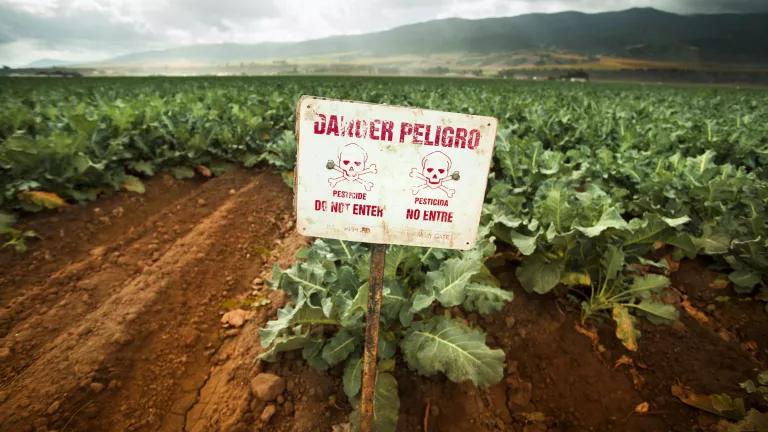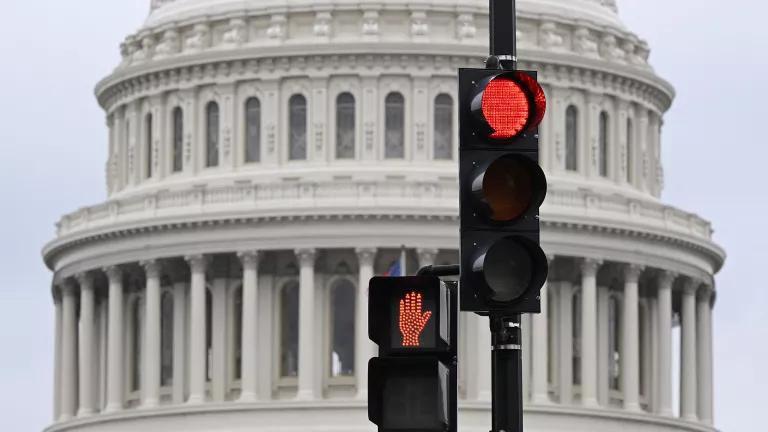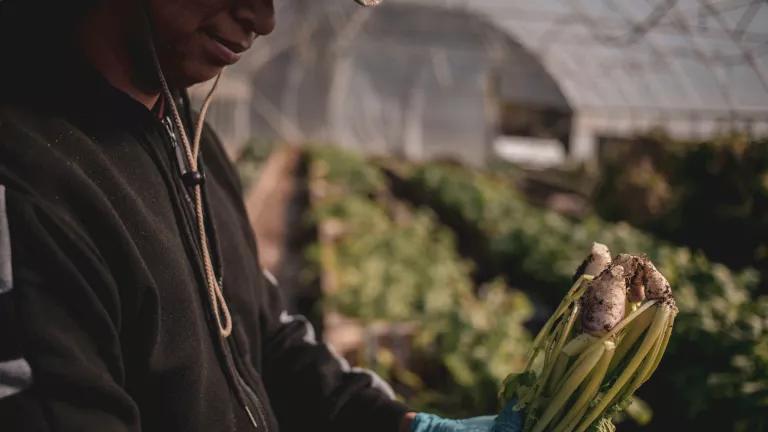Effects of Concentration on America’s Food Supply
My testimony before the House Judiciary Subcommittee on Antitrust, Commercial, and Administrative Law, addressing the dominance of a few big companies at key points in the food chain.
On January 19, 2022, I had the pleasure of testifying before the House Judiciary Subcommittee on Antitrust, Commercial, and Administrative Law. This hearing was the fifth in a series focused on reviving competition. The focus of the hearing was the effects of consolidation and anti-competitive conduct on the U.S. food supply chain, and extensive testimony detailed impacts of these trends on workers, low-income families, farmers and ranchers, and small businesses. My testimony addressed how the dominance of a few big companies at key points in the food chain threatens the environment, health, and stability of our food and agriculture system. Below is my written testimony.
Testimony to House Judiciary Subcommittee on Antitrust, Commercial, and Administrative Law on Reviving Competition, Part 5: Addressing the Effects of Economic Concentration on America’s Food Supply
Our food system is in crisis. They say that bad luck comes in threes—but in the concentration world, we often speak in fours. Just four companies control half of the global supply of seeds. Four dominant companies control 82% of U.S. beef slaughter. And the four largest U.S. grocers control nearly half of the retail grocery market. These numbers are not outliers—key links throughout our food chain, from seed to processing to retail are controlled by just a few, huge companies that are profiting wildly at everyone else’s expense. Nor are these numbers new or surprising if you’ve been following trends—the food system crisis we face today is the product of several decades of steady consolidation and growing power imbalances that have contributed to extreme profits for a handful of companies. Those companies’ financial success comes at the expense of devastation for our environment and our farming communities—and especially for the hardworking and talented people who make sure food moves from the fields to our tables.
The threats to environment, health, and stability posed by this food system stranglehold are being felt acutely across the country right now—in ecosystems, kitchens, and small businesses alike.
- Agricultural pollution: The dominant approach to agriculture in the U.S. harms the climate, as well as the health of workers, rural communities, and ecosystems. Major agrichemical and meat sector players profit from overreliance on fossil fuel-based pesticides and fertilizers and concentrated animal production, which contribute significantly to the 10% of U.S. greenhouse gas emissions attributed to agriculture, along with a wide range of other health threats. And even though healthier, climate-friendly approaches to farming, like organic and regenerative agriculture, have strong track-records of success, agribusiness interests continue to beat back any efforts to provide stronger oversight and public investments in alternatives.
- Price & work imbalances: The biggest players in the food system have outsized power to shape the economics and safety of living and working in the U.S. Major companies have enjoyed record-breaking profits during the COVID-19 crisis, while food system workers, farmers and ranchers, and consumers are all struggling to make ends meet and stay healthy and safe—to be paid a living wage, afford nourishing foods, and meet their other basic needs.
- National security: With very few companies in the lead, the long, complex supply chains that we rely on to eat daily are extremely vulnerable to disruption by health and environmental disasters—and a problem in a single location can ripple rapidly across the nation. Local and regional food supplies can be more nimble and resilient in the face of adversity, but small businesses struggle to compete in a marketplace skewed toward the largest players.
To understand the full range of impacts that follow from and are reinforced by consolidation, it is critical to recognize that size matters—and it matters for more than economic reasons. Justice Brandeis wrote compelling about the threat of outsized power in his opinions, including his dissent in Louis K. Liggett Co. v. Lee, 288 U.S. 517, 565 (1933), where he observed, “size alone gives to giant corporations a social significance not attached ordinarily to smaller units of private enterprise.” In other words, when you’re big, you have more economic power, but you also have more political and social power—and that’s a problem for health, the environment, and democracy. Big is a problem when it means the power to unilaterally set agendas, drown out other voices, and extract wealth and resources with no meaningful repercussions.
Today, the largest players in our food system have disproportionate power to influence who eats what, where, and at what price, as well as who profits and who bears the costs. When you are much bigger than your competitor, your buyer, or your seller, and when you have financial and other resources at your disposal, you are in control.
Our antitrust laws attempt to bring some fairness to our marketplace and keep power dispersed, so one or a few players can’t dominate. These laws are intended to protect not just economic freedom, but also political and social freedom. However, antitrust enforcement has narrowed in recent decades and sidelined the political and social impacts of consolidation. Weak enforcement—combined with unbalanced tax policies and a dominant approach to agriculture that harms health, the environment, and local economies—has resulted in unprecedented consolidation and a precarious food system.
The harms traded for profits in the highly consolidated seed and agricultural input sectors highlight the environmental and health harms that result from outsized corporate power. While public seed development used to be a major source of genetic diversity in U.S. agriculture, the dominant agricultural input companies have steadily narrowed their offerings, resulting in less choice for farmers about what to grow, less crop diversity that could help farms survive in a changing climate, and increasing input prices that funnel wealth from farming communities to the dominant agribusinesses. In addition, the continued use of dangerous pesticides threatens the health of farmworkers and their communities, as well as ecosystems. Major agricultural pesticides have been linked to increased risks of cancer, developmental problems, and a long list of other health threats; they also destroy pollinators and pollute waterways and air. Synthetic pesticides also contribute to the climate crisis—through fossil fuel-intensive production and transportation, contributions to nitrous oxide emissions from soil, and interference with soil health and capacity to sequester carbon. Organic producers have repeatedly demonstrated that it’s possible to farm without toxic inputs—and it’s actually healthier, more profitable, and protects our climate. Even so, dominant pesticide companies reap substantial profits by continuing to sell toxic chemicals, and they fund research, marketing, and lobbying efforts that ensure they can do so indefinitely and at little cost. These companies do not shoulder the vast health costs to society, and they are not held responsible for contributing to climate change and collapsed ecosystems. They profit, and everyone else pays, with the heaviest burdens falling on the most vulnerable people and places.
Consolidation contributes to externalized costs and harms at every link in our food chain, and it will take a cohesive, multi-prong approach to shift toward the fair, safe, healthy, and climate-friendly food system we desperately need. Our synergistic strategies must include:
- Antitrust enforcement: We have strong antitrust laws, but we’re not using them enough or making new case law that reflects modern problems. The FTC, DOJ, and USDA need a reinvigorated approach, as well as budgets commensurate with the scope of the problem that allow them to see cases through to resolution. The antitrust laws could also be amended to more clearly target unfair practices that result in environmental and health harms and include more opportunities for public participation and citizen suits.
- Congressional oversight: Congress should step up direct oversight of the dominant companies in every food sector and examine the impacts and public costs of consolidation on the environment, workers, farming communities, and small businesses.
- Tax reforms: We need more mechanisms to ensure that companies shoulder their fair share of public investments—particularly when they contribute significantly to pollution, climate change, soil depletion, resource scarcity, species loss, and other issues.
- Fair agricultural policy and public investments: We need to carefully scrutinize the distributional impacts of our agricultural investments. For example, when we think about promoting climate-friendly agriculture, are we thinking about resources that will be accessible and helpful to smaller-scale farms that produce a wide range of products? Are we working to remedy past and current injustices that have stripped Black, Indigenous, and other communities of color of land and wealth? Are we spending public dollars in ways that will make healthy food more affordable and widely accessible? Or are we further skewing the playing field in favor of those who need the least help?
While the problems are pervasive, and the solutions complex, there are reasons to be hopeful. Concerns about consolidation in the food system defy party lines, because there are so many people, places, and resources who benefit from fairness and so few who benefit from outsized wealth and power. We have leaders through the federal government committed to fostering fair competition, supporting local and regional food systems, and fighting climate change, and we have strong grassroots demand for fairness bubbling across the country. The COVID-19 crisis has brought the vulnerability of a highly consolidated food chain into sharp focus. The solutions are ready, and it’s time to act.



